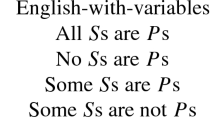Abstract
If logic programs are interpreted over a three-valued logic, then often Kleene’s strong three-valued logic with complete equivalence and Fitting’s associated immediate consequence operator is used. However, in such a logic the least fixed point of the Fitting operator is not necessarily a model for the program under consideration. Moreover, the model intersection property does not hold. In this paper, we consider the three-valued Łukasiewicz semantics and show that fixed points of the Fitting operator are also models for the program under consideration and that the model intersection property holds. Moreover, we review a slightly different immediate consequence operator first introduced by Stenning and van Lambalgen and relate it to the Fitting operator under Łukasiewicz semantics. Some examples are discussed to support the claim that Łukasiewicz semantics and the Stenning and van Lambalgen operator is better suited to model commonsense and human reasoning.
Preview
Unable to display preview. Download preview PDF.
Similar content being viewed by others
References
Apt, K.R., Pedreschi, D.: Reasoning about termination of pure Prolog programs. In: Information and Computation (1993)
Bader, S., Hölldobler, S.: The core method: Connectionist model generation. In: Kollias, S.D., Stafylopatis, A., Duch, W., Oja, E. (eds.) ICANN 2006. LNCS, vol. 4132, pp. 1–13. Springer, Heidelberg (2006)
Bader, S., Hitzler, P., Hölldobler, S.: Connectionist model generation: A first-order approach. Neurocomputing 71, 2420–2432 (2008)
Byrne, R.M.J.: Suppressing valid inferences with conditionals. Cognition 31, 61–83 (1989)
Clark, K.L.: Negation as failure. In: Gallaire, H., Minker, J. (eds.) Logic and Databases, pp. 293–322. Plenum, New York (1978)
d’Avila Garcez, A.S., Broda, K., Gabbay, D.M.: Neural-Symbolic Learning Systems: Foundations and Applications. Springer, Heidelberg (2002)
Fitting, M.: A Kripke–Kleene semantics for logic programs. Journal of Logic Programming 2(4), 295–312 (1985)
Fitting, M.: Metric methods – three examples and a theorem. Journal of Logic Programming 21(3), 113–127 (1994)
Gelfond, M., Lifschitz, V.: The stable model semantics for logic programming. In: Proceedings of the International Joint Conference and Symposium on Logic Programming, pp. 1070–1080. MIT Press, Cambridge (1988)
Hitzler, P., Seda, A.K.: Characterizations of classes of programs by three-valued operators. In: Gelfond, M., Leone, N., Pfeifer, G. (eds.) LPNMR 1999. LNCS, vol. 1730, pp. 357–371. Springer, Heidelberg (1999)
Hitzler, P., Wendt, M.: The well-founded semantics is a stratified fitting semantics. In: Jarke, M., Koehler, J., Lakemeyer, G. (eds.) KI 2002. LNCS, vol. 2479, pp. 205–221. Springer, Heidelberg (2002)
Hölldobler, S., Kencana Ramli, C.D.: Logics and networks for human reasoning. Technical report, International Center for Computational Logic, TU Dresden (submitted, 2009)
Kleene, S.C.: Introduction to Metamathematics. North-Holland, Amsterdam (1952)
Lloyd, J.W.: Foundations of Logic Programming. Springer, Berlin (1993)
Łukasiewicz, J.: O logice trójwartościowej. Ruch Filozoficzny 5, 169–171 (1920); On Three-Valued Logic. In: Borkowski, L. (ed.) Jan Łukasiewicz Selected Works, pp. 87–88. North Holland (1990) (English translation)
Mycroft, A.: Logic programs and many-valued logic. In: Fontet, M., Mehlhorn, K. (eds.) STACS 1984. LNCS, vol. 166, pp. 274–286. Springer, Heidelberg (1984)
Naish, L.: A three-valued semantics for logic programmers. Theory and Practice of Logic Programming 6(5), 509–538 (2006)
Stenning, K., van Lambalgen, M.: Human Reasoning and Cognitive Science. MIT Press, Cambridge (2008)
Stoy, J.E.: Denotational Semantics. MIT Press, Cambridge (1977)
van Gelder, A., Ross, K.A., Schlipf, J.S.: The well-founded semantics for general logic programs. Journal of the ACM 38, 620–650 (1991)
Author information
Authors and Affiliations
Editor information
Editors and Affiliations
Rights and permissions
Copyright information
© 2009 Springer-Verlag Berlin Heidelberg
About this paper
Cite this paper
Hölldobler, S., Kencana Ramli, C.D.P. (2009). Logic Programs under Three-Valued Łukasiewicz Semantics. In: Hill, P.M., Warren, D.S. (eds) Logic Programming. ICLP 2009. Lecture Notes in Computer Science, vol 5649. Springer, Berlin, Heidelberg. https://doi.org/10.1007/978-3-642-02846-5_37
Download citation
DOI: https://doi.org/10.1007/978-3-642-02846-5_37
Publisher Name: Springer, Berlin, Heidelberg
Print ISBN: 978-3-642-02845-8
Online ISBN: 978-3-642-02846-5
eBook Packages: Computer ScienceComputer Science (R0)



